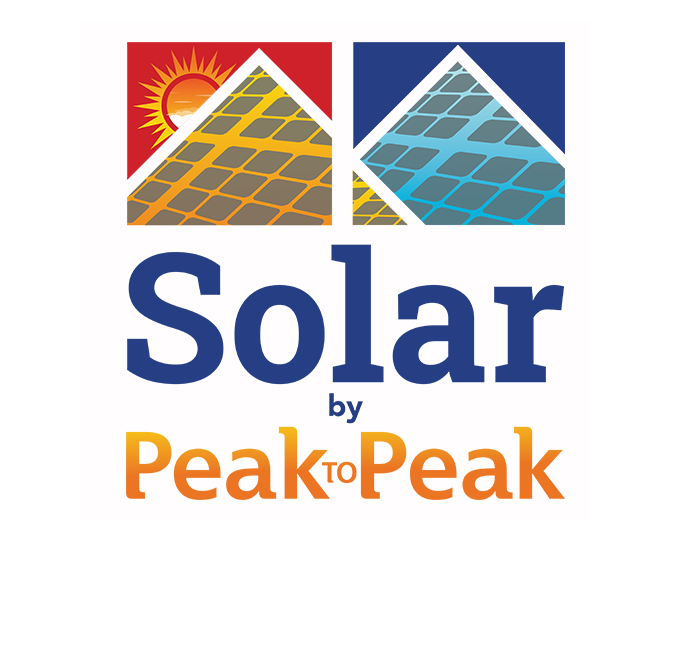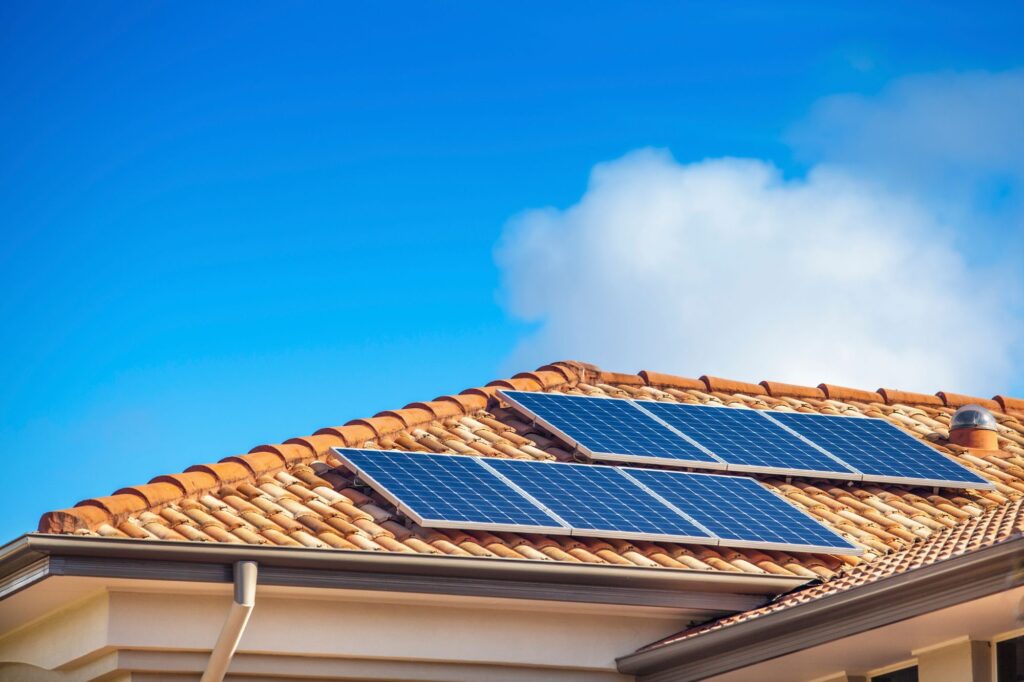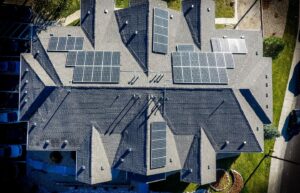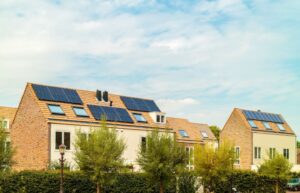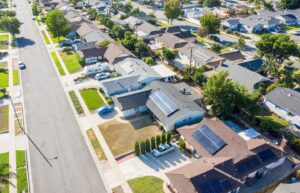The answer to how many solar panels you need to power a house depends on a few factors. In today’s article, we will give you the knowledge to start assessing your solar needs for your house, as well as some general information about solar panel systems.
Let’s get started!
How To Measure Your House for Solar Panels
In this section, we’ll go over how to measure your house for solar panels. This will give you a baseline for how many solar panels you need to power your home.
Find Out How Much Energy You Use
First, you need to assess how much energy consumption your household uses on average per day. This will give you a baseline for how much solar energy you need to generate.
You can calculate your home’s daily power usage by looking at your past electricity bills. If you don’t have any past bills, you can use an online calculator like this one from the U.S. Department of Energy (DOE).
Find Out Your Home’s Daily Sun Exposure
Once you know how much electricity your home uses on average, you need to determine how much sunlight your home receives. This information will help you choose the right type and size of solar panel for your needs.
You can use an online solar insolation calculator like this one from the National Renewable Energy Laboratory (NREL) to find out how much sunlight your location receives.
Add Up the Number of Solar Panels You Need
Armed with these two pieces of information, you can now calculate the number of solar panels you need to power your home. Here is a simple formula to follow:
Number of solar panels needed = (Daily energy usage in kWh) / (Solar insolation in kWh/m2/day)
For example, let’s say that your home has 30 kWh of energy usage per day and you live in a location that receives 4 kWh/m2/day of solar insolation. Using the formula above, we can calculate that you would need 7.5 solar panels to fulfill your home’s energy usage needs.
What Is an Average Solar Panel Wattage?
Solar panel wattage varies depending on the type and size of the solar panels.
Most solar panels are made from silicone. And, when we say “most solar panels,” we mean about 95% of solar panels. Silicon solar panels you need for your home come in three main types: monocrystalline, polycrystalline, and film solar panels.
The average solar panel wattage for monocrystalline solar panels is between 150-200 watts. For polycrystalline panels, it is between 135-175 watts. And for thin film solar panels, it is between 50-150 watts.
Keep in mind that these are just averages and that your needs may vary depending on your specific circumstances.
Measure Your Roof Space
After you know how many solar panels you need to cover your energy usage, you have to make sure they’ll fit. that means you need to measure the space on your roof that will be dedicated to solar panels. This will help you determine the number of solar panels you can fit on your roof.
To measure your roof space, you’ll need to take the following measurements:
- Length of the roof
- Width of the roof
- Pitch of the roof (the angle of the roof)
Different Types of Solar Panel Systems
Now that you know how to calculate the number of solar panels you need to power your home, it’s time to learn about the different types of solar panel systems. There are two main types of solar panel systems:
1. Grid-tied solar panel systems
2. Off-grid solar panel systems
Grid-Tied Solar Panel Systems
Grid-tied solar panel systems is connected to the electrical grid and can provide your home with both power and backup power in case of a power outage. Off-grid Denver solar panel systems are not connected to the electrical grid and must generate all of the power your home needs on its own.
Grid-tied solar panel systems are more expensive than off-grid systems because they require additional components like batteries and a backup generator. However, they are more convenient because you don’t have to worry about generating all of the power your home needs on your own.
Off-Grid Solar
Off-grid solar panel systems are less expensive than grid-tied systems, but they require more maintenance and planning. You need to make sure that your off-grid system is sized correctly so that it can generate enough power for your needs.
You also need to have a backup plan in case of cloudy days or other situations where your Brighton solar panels are not able to generate enough power.
Now that you know the basics of how many solar panels you need to power a house, as well as the different types of solar panel systems, you can start planning your own solar energy system.
What if I Don’t Want to Install My Own Solar Panels?
If you’re not interested in installing your own solar panel system, there are other options available. You can purchase a solar energy system from a solar panel installer or retailer.
You can also lease a solar panel system from a solar panel company. This option is becoming more popular as it doesn’t require a large upfront investment.
No matter which option you choose, make sure to do your research so that you find the best deal for your needs.
How To Choose the Right Solar Installation Company
If you’ve decided that you want to purchase or lease solar panels, the next step is to find a reputable solar installation company. Here are a few things to keep in mind when choosing a solar installation company:
1. Obtain References
Ask for references from past customers and check online reviews. This will give you an idea of what other people have experienced with the company.
2. Estimates Are Necessary
Get multiple quotes from different companies so that you can compare prices and services.
3. What’s the Warranty?
Make sure the company offers a warranty on their work. This will protect you in case there are any problems with the installation.
4. Ask Questions!
Don’t be afraid to ask the company about their experience, what type of Boulder solar panels they recommend for your home, and how they will handle the installation process.
By following these tips, you can be sure that you find a reputable solar installation company that will do a great job of installing your solar system or solar array.
How Much Do Solar Panels Cost?
Solar panels are a major investment, but they can save you money in the long run. The cost of solar panels has dropped significantly in recent years, making them more affordable than ever.
The average cost of solar panels is $3 per watt. This means that a 100-watt Littleton solar panel should cost somewhere around $300. The price of solar panels will vary depending on the size and efficiency of the panel. It will also depend on demand and availability since more people have been installing them and there have been electrical component shortages all around the world. And, obviously, the more solar panels you install, the greater the upfront cost will be.
You can also save money by installing your own solar system. If you’re handy and have some experience with electrical work, you can install your own system for around $1,000. We don’t recommend this route because it’s dangerous to work on your roof and to work with electricity. We recommend hiring a specialist, like Solar by Peak to Peak.
Maintenance for Solar Panels
Once your solar system is installed, it’s important to keep it well-maintained. Solar panels require very little maintenance, but it’s important to clean them regularly to keep them working efficiently.
You should also check the inverter and batteries monthly to make sure they are working properly. If you have a grid-tied system, you’ll also need to monitor the utility company’s power grid to make sure your system is generating enough power.
By following these simple tips, you can keep your solar system in good shape and generate plenty of power for your home.
What Are the Benefits of Solar Energy?
Solar energy has many benefits, both for the environment and for your wallet. Here are some of the top benefits of solar energy:
1. Solar energy is renewable and environmentally friendly.
2. Solar panels can save you money on your electric bill.
3. Solar panel systems require very little maintenance.
4. Solar energy can be used to power your entire home or just a few appliances.
5. Having a number of solar panels can increase the value of your home.
6. Installing solar panels can garner you a hefty federal tax credit.
If you’re looking for an environmentally friendly way to save money on your electric bill and reduce your on-grid monthly electricity consumption, solar energy is a great option. With so many benefits, it’s no wonder that solar panel systems are becoming more popular every year. Solar panels power more and more homes each and every day. Could yours be next?
Are You Ready to Go Solar?
If you’re considering switching to a solar energy system, now is a great time to do it. With advances in technology and a decrease in cost, solar panel systems are more affordable and efficient than ever before.When you’re ready to make the switch and install solar panels, be sure to do your research and choose a reputable solar installation company, like Solar by Peak to Peak. They offer free solar installation evaluations. With a little planning, you can soon be enjoying all the benefits of a solar system or solar array.
